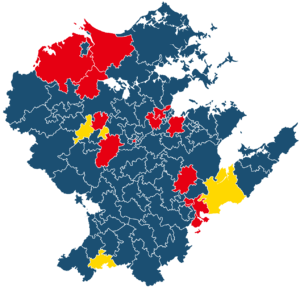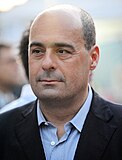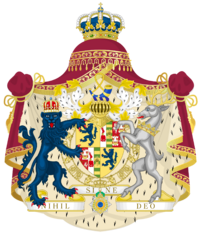2016 Mascyllary prime ministerial election
| |||||||||||||||||||||||||
| Registered | 30,556,667 ( | ||||||||||||||||||||||||
|---|---|---|---|---|---|---|---|---|---|---|---|---|---|---|---|---|---|---|---|---|---|---|---|---|---|
| Turnout | 24,170,323 (79.1%) | ||||||||||||||||||||||||
| |||||||||||||||||||||||||
 Results by administrative districts (Landeskreise): Thomas Falkner Susanne Höpken Alexander Bratge | |||||||||||||||||||||||||
| |||||||||||||||||||||||||
The 2016 Mascyllary prime ministerial election was held in Mascylla on 15 April 2016. The leader and nominee of the RU (in coalition with the ABP), Thomas Falkner, defeated the nominee of the SDP, Susanne Höpken, and the leader of the MDP, Alexander Bratge, with a decisive majority.
Falkner emerged as his party's front-runner amidst a wide range of potential candidates, mainly due to his leadership of the party and increasing approval ratings, having set a campaign focused on social inclusiveness and government transparency. A major nominee of the RU was Steffen Meßner, who was pulled out for citing irreconcilable differences between the party agenda and his beliefs on healthcare and energy policies, leading to his resignation and entry to the National Democrats, where he tried running for office, but wasn't able to achieve any significant support. Susanne Höpken emerged quickly as the SDP's candidate, advocating for LGBTQ+ and women's rights. Alexander Bratge was also instantaineously chosen as the MDP's nominee and proposed inclusive capitalism and healthcare reforms. The tone of the election campaign is often cited by media coverage as rather inclusive, non-polarising, formal and surprisingly respectful.
First estimations of the result on 15 April indicated and already predicted a decisive margin for Falkner, and his opponents immediately conceded defeat. After election day, the Ministry of the Realm published preliminary results and a few hours later proclaimed the official outcome to the public. Overall, Falkner won with 62.9% of the votes, with Höpken achieving 31.3%, a result somewhat higher than expected, and Bratge with 5.8%; two-thirds of eligible voters decided for Falkner. When Falkner assumed office on 14 September 2016, he became the 13th and youngest Prime Minister in Mascyllary history and the fourth one to be older than the sitting monarch. He named his cabinet and assembled his government the next day. From the results of the 2015 federal elections, he was able to work with a substantial majority in the Reichsrat.
Falkner announced he would not be running for another term, while Susanne Höpken and the leadership of the SDP stated she will attend another election nomination in 2024. Bratge is quoted to be expected to return as well.



